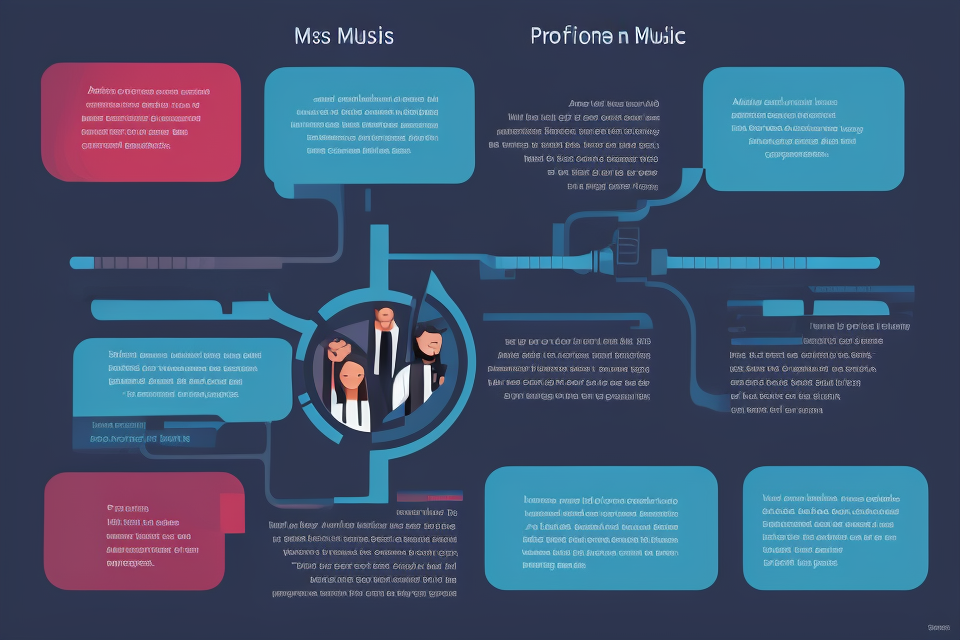
In the music industry, artists rely on a team of professionals to help them navigate the business side of their careers. From managers to agents, lawyers to publicists, each member of the team plays a crucial role in an artist’s success. But who represents a music artist? This is a question that many aspiring musicians and music industry professionals alike often wonder about. In this article, we will explore the different roles and responsibilities of the various professionals who work with music artists, and provide insights into how they help shape an artist’s career. Whether you’re an artist looking to build your team, or simply curious about the inner workings of the music industry, read on to discover who represents a music artist and what they do.
The Importance of Having Representation in the Music Industry
The Role of an Agent in Representing a Music Artist
Negotiating Contracts and Deals
One of the primary roles of an agent in representing a music artist is negotiating contracts and deals on their behalf. This includes negotiating record deals, publishing deals, and touring agreements. An agent works to secure the best possible terms for their client, taking into account factors such as advances, royalties, and creative control. They also help their client understand the terms of the contract and advise them on any legal implications.
Providing Guidance on Career Decisions
An agent also provides guidance on career decisions for their client. This includes advising them on which record label or publishing company to sign with, which songs to release as singles, and which tour dates to accept. They use their knowledge and experience of the industry to help their client make informed decisions that will further their career.
Building Relationships with Industry Professionals
Another important role of an agent is building relationships with industry professionals on behalf of their client. This includes other agents, managers, record executives, and promoters. By building these relationships, an agent can help their client get access to opportunities that they may not have been able to access otherwise. They also use their relationships to negotiate better deals for their client and to protect their client’s interests in the industry.
Overall, the role of an agent in representing a music artist is critical to their success in the industry. They provide guidance, negotiate deals, and build relationships on behalf of their client, helping them navigate the complex and competitive world of the music industry.
The Role of a Manager in Representing a Music Artist
A music manager plays a crucial role in the career of a music artist. They oversee the creative direction of the artist’s career, handle business and financial matters, and develop and implement marketing strategies. In this section, we will delve deeper into the role of a music manager in representing an artist.
Overseeing the Creative Direction of the Artist’s Career
A music manager is responsible for guiding the artist’s career in the right direction. They work closely with the artist to understand their vision and goals, and then they create a plan to achieve them. This includes selecting the right songs to record, choosing the best producers to work with, and developing a stage show that will engage audiences. The manager also works with the artist to develop their image and brand, ensuring that they are portrayed in the best possible light.
Handling Business and Financial Matters
In addition to their creative responsibilities, music managers also handle the business and financial aspects of an artist’s career. This includes negotiating contracts, securing record deals, and overseeing the financial aspects of the artist’s career. They are responsible for ensuring that the artist is paid fairly for their work and that they receive a fair share of the profits from their record sales and live performances.
Developing and Implementing Marketing Strategies
Music managers are also responsible for developing and implementing marketing strategies to promote the artist’s work. This includes creating promotional campaigns, arranging interviews and photo shoots, and working with the media to generate buzz around the artist. They also work with the artist’s record label to develop a plan for releasing new music and promoting it to the public.
Overall, the role of a music manager is multifaceted and critical to the success of a music artist. They are responsible for overseeing the creative direction of the artist’s career, handling business and financial matters, and developing and implementing marketing strategies. Without a skilled manager, an artist may struggle to navigate the complex and competitive music industry.
The Role of a Lawyer in Representing a Music Artist
A lawyer plays a crucial role in representing a music artist in the music industry. The primary responsibilities of a lawyer include drafting and reviewing contracts and agreements, providing legal advice on copyright and trademark issues, and handling disputes and negotiations.
Drafting and Reviewing Contracts and Agreements
One of the primary responsibilities of a lawyer in representing a music artist is drafting and reviewing contracts and agreements. Lawyers are responsible for ensuring that contracts and agreements are legally binding and protect the interests of the music artist. They review contracts for fair terms and conditions, advise their clients on the legal implications of the terms, and negotiate any changes to the contracts that may be necessary.
Providing Legal Advice on Copyright and Trademark Issues
Another essential role of a lawyer in representing a music artist is providing legal advice on copyright and trademark issues. Lawyers ensure that their clients’ work is protected by copyright laws and advise them on the legal implications of using other people’s work in their music. They also help their clients protect their brand by registering trademarks and enforcing trademark rights.
Handling Disputes and Negotiations
A lawyer also plays a critical role in handling disputes and negotiations on behalf of a music artist. Lawyers are responsible for negotiating contracts and agreements, resolving disputes between the artist and other parties, and representing the artist in court if necessary. They work to protect the artist’s interests and ensure that they receive fair compensation for their work.
In summary, a lawyer plays a vital role in representing a music artist in the music industry. They are responsible for drafting and reviewing contracts and agreements, providing legal advice on copyright and trademark issues, and handling disputes and negotiations. A lawyer’s expertise is essential in protecting the interests of a music artist and ensuring that they receive fair compensation for their work.
The Role of a Publicist in Representing a Music Artist
Building and Maintaining Relationships with the Media
A publicist plays a crucial role in establishing and nurturing relationships with journalists, bloggers, and other members of the media. They work to ensure that their client, the music artist, receives adequate coverage in various media outlets. This includes securing interviews, press junkets, and other media opportunities that can help increase the artist’s visibility and promote their music.
Coordinating Interviews and Press Appearances
Another essential function of a publicist is to coordinate interviews and press appearances for their client. This involves reaching out to media outlets, arranging schedules, and providing necessary background information to facilitate the interview process. The publicist also works closely with the artist to prepare them for interviews, ensuring that they are well-rehearsed and ready to provide engaging and informative responses.
Developing and Executing Publicity Campaigns
In addition to managing interviews and press appearances, a publicist is responsible for developing and executing publicity campaigns on behalf of their client. This may involve crafting press releases, creating promotional materials, and identifying relevant media outlets to target for coverage. The publicist works closely with the artist and their team to develop a strategic plan for promoting their music and managing their public image. By executing effective publicity campaigns, a publicist can help their client gain exposure, build their fan base, and ultimately achieve greater success in the music industry.
The Role of a Producer in Representing a Music Artist
Overseeing the Recording and Production Process
A music producer plays a crucial role in the creation of an artist’s music. They are responsible for overseeing the entire recording and production process, from the initial concept to the final mix. This includes working with the artist to develop their musical ideas, selecting songs for the album, and arranging instrumentation and vocals. A good producer will have a strong creative vision and the technical skills to bring that vision to life.
Providing Guidance on Musical Direction
In addition to overseeing the production process, a music producer also provides guidance on the artist’s musical direction. This can include offering advice on songwriting, arranging, and instrumentation, as well as helping the artist develop their unique sound and style. A producer may also work with the artist to identify their strengths and weaknesses, and help them to improve their musical abilities.
Identifying and Securing Opportunities for the Artist
A music producer can also play a key role in helping an artist to achieve success in the industry. This may include identifying and securing opportunities for the artist, such as performances, record deals, and endorsements. A producer with a strong network of industry contacts can be invaluable in helping an artist to break into the industry and build their career.
The Role of a Booking Agent in Representing a Music Artist
Securing Gigs and Performances
A booking agent plays a crucial role in securing gigs and performances for a music artist. They have established relationships with promoters, venue owners, and event organizers, and they use these connections to find suitable opportunities for the artist to perform. They negotiate with promoters and venue owners to secure performance slots and ensure that the artist is well-compensated for their services.
Negotiating Fees and Contracts
Booking agents are responsible for negotiating fees and contracts on behalf of the music artist. They work with promoters and venue owners to determine the fee that the artist will receive for their performance. They also ensure that the contracts protect the interests of the artist and include clauses that address issues such as payment terms, travel expenses, and equipment rental.
Coordinating Travel and Logistics
Booking agents are responsible for coordinating travel and logistics for the music artist. They work with the artist to determine the best travel arrangements and book flights, hotels, and transportation. They also coordinate with the venue to ensure that the artist has access to the necessary equipment and that the stage setup is appropriate for their performance. Additionally, they handle any other logistical issues that may arise, such as accommodating special requests or dealing with unforeseen circumstances.
Finding the Right Representation for Your Music Career
Identifying Your Needs and Goals as an Artist
As a music artist, it is essential to have a clear understanding of your needs and goals in order to find the right representation for your music career. This involves assessing your strengths and weaknesses, determining your long-term career goals, and identifying the areas where you need the most support.
Assessing Your Strengths and Weaknesses
The first step in identifying your needs and goals as a music artist is to assess your strengths and weaknesses. This involves taking an honest look at your skills, abilities, and experience as a musician.
- What are your unique strengths as a musician?
- What areas do you need to improve upon?
- What are your unique qualities that set you apart from other artists?
Determining Your Long-Term Career Goals
Once you have assessed your strengths and weaknesses, the next step is to determine your long-term career goals. This involves setting specific, measurable, achievable, relevant, and time-bound (SMART) goals for your music career.
- What do you want to achieve as a musician in the short-term and long-term?
- Where do you see yourself in five years, ten years, or even twenty years?
- What steps do you need to take to achieve your goals?
Identifying the Areas Where You Need the Most Support
After assessing your strengths and weaknesses and determining your long-term career goals, the next step is to identify the areas where you need the most support. This involves identifying the areas where you need help to achieve your goals, such as finding the right representation, building your fan base, or improving your music skills.
- What areas do you need the most support in?
- What kind of support do you need to achieve your goals?
- How can you get the support you need?
By identifying your needs and goals as a music artist, you can better understand what you need to do to achieve success in the music industry. This will help you find the right representation and take the necessary steps to achieve your goals.
Researching and Contacting Potential Representatives
Researching and contacting potential representatives is a crucial step in finding the right representation for your music career. Here are some tips to help you with this process:
- Identifying potential agents, managers, lawyers, publicists, producers, and booking agents: The first step is to identify the different professionals who can represent you in the music industry. These include agents, managers, lawyers, publicists, producers, and booking agents. Each of these professionals has a different set of skills and responsibilities, so it’s important to understand what each one does before reaching out to them.
- Researching their backgrounds and reputations: Once you have identified potential representatives, it’s important to research their backgrounds and reputations. This can be done by looking at their past work, client list, and reviews from other clients. It’s important to work with professionals who have a proven track record of success in the music industry.
- Reaching out to them with your interests and goals: After researching potential representatives, it’s time to reach out to them. This can be done by sending an email or a message through social media. It’s important to be clear about your interests and goals and to explain why you think they would be a good fit for your music career.
Overall, researching and contacting potential representatives requires a lot of research and effort. However, by taking the time to find the right representation, you can set yourself up for success in the music industry.
Evaluating and Choosing the Right Representation for You
When it comes to finding the right representation for your music career, it’s important to carefully evaluate and choose the right professional to work with. Here are some key factors to consider when assessing potential representatives:
- Experience and Track Record: Look for professionals who have a proven track record of success in the music industry. This could include experience working with similar artists, as well as a history of securing deals and achieving positive results for their clients. It’s important to consider their experience and expertise in the specific areas that you need help with, such as record deals, publishing deals, or tour management.
- Communication and Work Style: Good communication is key in any professional relationship, and this is especially true when it comes to working with a music representative. Look for professionals who are responsive, reliable, and easy to communicate with. Consider their work style and whether it aligns with your own. Do they prefer frequent meetings and updates, or do they take a more hands-off approach? It’s important to find someone who you feel comfortable working with and who can adapt to your specific needs.
- Skills and Resources: In addition to experience and communication skills, it’s important to consider the skills and resources that a potential representative brings to the table. Look for professionals who have a strong network of industry contacts, as well as access to resources such as studio time, production teams, and marketing resources. It’s also important to consider whether they have the specific skills and expertise needed to support your unique needs as an artist.
Overall, finding the right representation for your music career requires careful evaluation and consideration. By taking the time to assess potential professionals based on their experience, communication style, and skills, you can ensure that you find a representative who will help you achieve your goals and take your music career to the next level.
FAQs
1. Who represents a music artist?
Answer:
In the music industry, there are several professionals who can represent a music artist, including managers, agents, lawyers, and publicists. Each of these professionals plays a different role in the artist’s career and can provide different types of support and guidance. For example, a manager may oversee the artist’s career and make important decisions on their behalf, while an agent may be responsible for booking the artist’s performances and negotiating their contracts. It’s important for an artist to have a team of professionals who can help them navigate the industry and achieve their goals.
2. What does a music manager do?
A music manager is responsible for overseeing an artist’s career and making important decisions on their behalf. This can include things like booking performances, negotiating contracts, and managing the artist’s finances. A manager may also provide guidance and support to the artist, helping them to develop their skills and reach their full potential. In some cases, a manager may also be responsible for finding new opportunities for the artist, such as recording contracts or endorsement deals.
3. What does a music agent do?
A music agent is responsible for booking performances for an artist and negotiating their contracts. This can include things like securing gigs at venues, negotiating fees and terms, and working with other professionals in the industry to make sure that the artist’s performances go smoothly. An agent may also be responsible for promoting the artist and helping them to build their fan base. In some cases, an agent may also be involved in the development of the artist’s career, helping them to find new opportunities and grow their audience.
4. What does a music lawyer do?
A music lawyer is responsible for providing legal guidance and support to an artist. This can include things like reviewing contracts, negotiating deals, and protecting the artist’s rights and interests. A lawyer may also be involved in the development of the artist’s career, helping them to understand the legal aspects of the industry and make informed decisions. In some cases, a lawyer may also be responsible for resolving disputes or conflicts that may arise in the course of the artist’s career.
5. What does a music publicist do?
A music publicist is responsible for promoting an artist and helping them to build their fan base. This can include things like writing press releases, arranging interviews, and securing coverage in the media. A publicist may also be involved in the development of the artist’s career, helping them to find new opportunities and grow their audience. In some cases, a publicist may also be responsible for managing the artist’s social media presence and building their brand.


